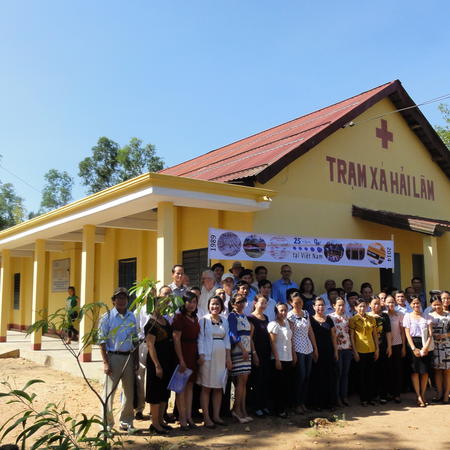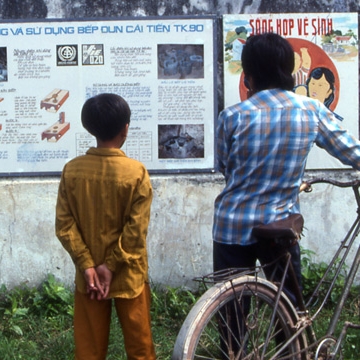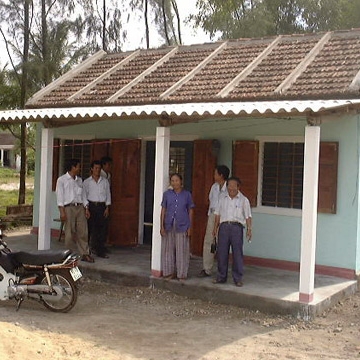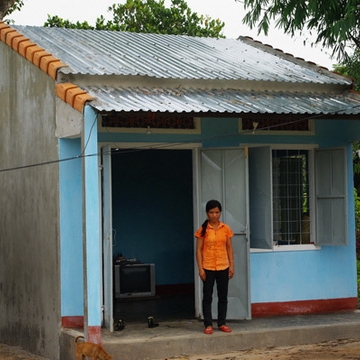- English
- Français
- Tiếng Việt
Vietnam
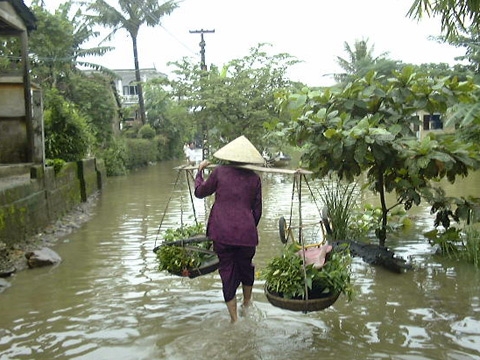
Developing capacity to reduce vulnerability & poverty
Reducing vulnerability to natural hazards and climate change and poverty reduction are intimately linked issues in Central Viet Nam. Too many people still live at risk and face complex and unpredictable climate events. Creating an environment in which people can live and work is fundamental to the development of communities and the region.
Development Workshop undertakes actions in Central Viet Nam that help families, communities, community leaders and civil society reduce vulnerability to natural disasters and develop the opportunities and the environment that contribute to poverty reduction.
- Key principles of safe construction: DW promotes the ‘10 key points’ of typhoon resistant construction – generic principles of safe cyclone resistant construction that apply to all types of housing using local resources.
- Getting the message across- Awareness raising relays the core message: “Take preventive action”. Making prevention a priority through participative animation about the need for prevention against disaster a cross cutting priority, using popular media, theatre, concerts, inter commune boat races, mobile displays and school events and plays by children – anything that will lodge the prevention idea in long term memories!
- Safer shelter: Since 1999 DW has implemented a programme for the preventive strengthening of existing houses in central Viet Nam. Roughly 70% of rural housing has been rebuilt by families since 1985, but the quality is poor and the result unable to resist the effects of storms and floods. DW helps families strengthen their existing home, at an average extra cost of 20% of the total value of their house.
- Supporting institutional capacity to help the community and gender balance: DW works with the people’s committees, the unions and associations to strengthen the institutional capacity to develop action plans for vulnerability and poverty reduction and to be able to assist families. DW has promoted democracy in the village decision making process to ensure equitable selection of partner families and a balanced gender approach. Over 35% of beneficiary families are headed by women.
- Credit for safe and affordable houses: Supported by the Ford Foundation, since 2009 DW has introduced a new loan package in collaboration with the Vietnam Bank for Social Policy providing families with credit for house strengthening, repaid over 5 years. Families show they are keen to take this opportunity and are good at repayments. They recognise the social and economic value of a resistant safe home and the contribution it makes to family stability and growth.
- Access to safe schools and infrastructure: DW has worked with communes of the province of Thua Thien Hué to strengthen existing public infrastructure and build safe new schools, markets, health facilities. At village level, providing kindergartens helps small children access early education.
- Working with children:DW works with schools to train teachers about disaster prevention, and runs workshops with children about their concerns and actions in the event of disasters. Children are active in school and in the community in promoting the vulnerability reduction message: “Vaccinate your home against storms!” using school plays, competitions, and parades.
- Developing skills: DW provides training to local building brigades in all the commune where it works, in order to improve the general quality of building and in order to develop skills in disaster resistant construction. Trained builders both work on local construction programmes that brings in revenue, and act as building advisers to families in the community.
- Developing production opportunities: DW works with local construction materials producers to make components that can be used in making safer and affordable housing and infrastructure. New products such as tiles with fixing systems are piloted in public buildings.
In all its actions, DW places an emphasis on communication, exchange and education based on active community participation. Animation activities in the communes encourage participation and the involvement of families.
National Poverty Reduction Strategy [1.2MB]








